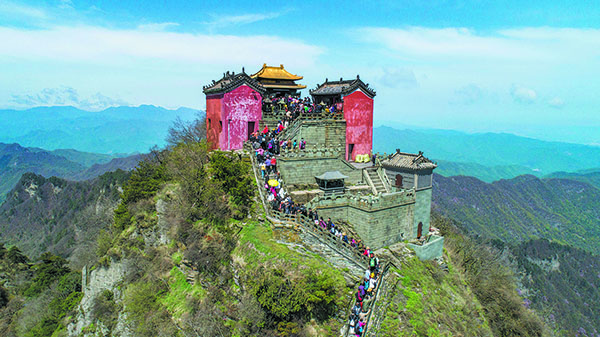Growing up in the United States, most of my introduction to China came through the lens of film. Bruce Lee and Jackie Chan taught me to become one with water to master the body to devastating effect. Crouching Tiger Hidden Dragon and Hero fine-tuned the idea so that I understood that physical mastery was more about attunement to the balance of nature and creating calmness and peace within oneself. As with all film-based education, these lessons were shallow, rooted in metaphor and narrative rather than fact. But there is one place where one can catch those impressions.
One autumn morning in 2013, I arrived at the foot of Wudang Mountain in Hubei province. My mother and younger brother were with me. Mom planned to ride the cable car to the top, but my brother and I had backpacks filled with water bottles and granola bars. Twenty thousand stone steps spiraled up the mountain ahead of us toward the Pillar-of-Heaven Peak, often accredited as the birthplace of Taoism.
I took the first step and counted "one" aloud. It was not a steep step, and I felt confident I would be fine getting to the top, having counted along the way. Around the 100 count, my brother asked me if I planned to count all morning. I inferred he was annoyed by the sound and began counting in my head.
After 500 steps, my thighs burned. I glanced at my watch. We'd been trekking for 30 minutes. Only 30 minutes? I thought. The visitor's center had told us the climb should take about four hours. Either my math is wrong, or I'm slow. We decided to take a break.
As we sat and refreshed our throats with cool water, I began to notice the surroundings. Oak and pine trees dotted the mountainside, their roots occasionally jutting out between weather-worn boulders. Some of the leaves had turned hues of orange and red. Glancing back, I saw that our starting point was no longer visible behind the web of tree branches.
A man dressed in a kasaya and straw hat came up the steps at an inhuman pace. He carried a drum filled with vegetables on his back. He passed us by, his worn leather sandals clapping rhythmically against the steps. My brother and I shared a look of embarrassment at seeing how easily the encumbered man climbed while we already needed a break and decided to continue.

Tourists ascend to Jinding (Golden Peak), the top of Pillar-of-Heaven Peak on the mountain. [PHOTO/CHINA NEWS SERVICE]
Time passed, one step after the other. I could no longer remember how my legs felt without the burn of fatigue. My thoughts gradually emptied. I began to smell oak and pine and osmanthus. The weight of my backpack felt as if it was my own weight. I heard birds twittering among the trees. From here came a blazing high-pitched melody, and from there came a low-pitched whine. Are they talking about me? I wondered.
We came upon a lone man with a basket of fresh cucumbers. I saw no buildings or infrastructure around him and realized he must have made this climb early in the morning to supply weary travelers with sustenance.
Five yuan ($0.7) bought us each a cucumber. I bit into it, desperate for the sweet juice that embraced my tongue. My American palate was not trained for the subtlety of vegetables. I could have sworn I was tasting the great riches of an emperor.
Again, we climbed. Now I felt the sun just over my head. Wind brushed across my cheeks and forehead like silk. Each breath filled my tired lungs with life.
We began to hear voices above us. We'd reached the top. We came to a crowded pavilion. Tourists took pictures here and there. Children chased each other across cobblestone paths.
We took turns examining each building. Their walls were an aged red. Curved ceramic tiles angled downward from the roofs, bearing the wear and tear of ages of rain, wind and snow.
The mountain plunged below us, giving way to neighboring mountains among misty clouds. My muscles ached, and my breath was uneven. In those moments, I understood what the old movies were trying to tell me. This was the spirit of China. We rode the rail car back down the mountain.
Editor Ⅰ: Zhang Wenwen
Editor Ⅱ: Wu Dan
Editor Ⅲ: Liu Guosong














